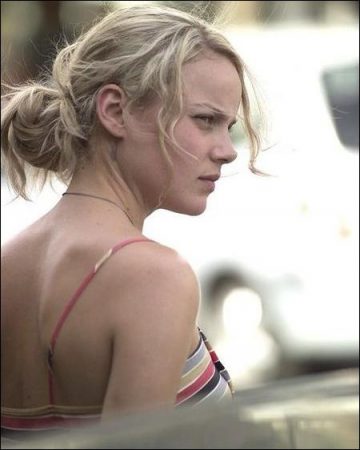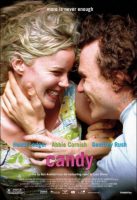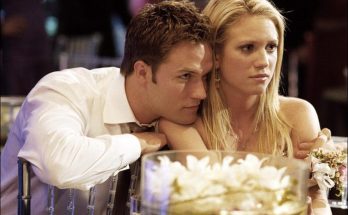Taglines: More is never enough.
Candy movie storyline. Acclaimed director Neil Armfield has adapted Luke Davies’ best-selling novel “Candy” and produced a contemporary love story of startling beauty for the screen. In the title role, Abbie Cornish delivers a fearless portrayal of a young artist whose lust for life takes her to the edge of sanity. Heath Ledger breathes a sweet and tender optimism into Dan, a sometime-poet lost in love with Candy.
In heroin they find a path to limitless pleasure. But as addiction takes hold they lose the very thing they sought. “Candy” opens the door on a dream vision that will have meaning for all who have been dazzled by the beauty of the world.
“Candy,” which is the feature helming debut of noted Australian stage director Neil Armfield, is based on the prize-winning novel by Luke Davies and was adapted for the screen by Davies and Armfield. In the film, recent Oscar-nominee Ledger stars as Dan, a charming but reckless young poet who has fallen in love with Candy (Abbie Cornish), a beautiful young art student from a comfortable middle-class family who is attracted to the bohemian lifestyle that Dan has long since embraced.
In order to get closer to Dan, Candy, whose previous drug use has been casually experimental, starts shooting up. Their passionate relationship then alternates between bursts of ecstatic oblivion and bouts of despair and self-destruction. Hooked as much on heroin as one another, their story becomes a love triangle – a boy, a girl, and a drug.
Originally published in 1997, Luke Davies’ novel Candy is a love story. It is also a novel about addiction. From the heady narcissism of the narrator’s first days with his new lover, Candy, and the relative innocence of their shared habit, Candy charts their decline. Candy becomes a prostitute, the narrator becomes a scam artist, and smack becomes the total and only focus of their lives. But this is not just another junkie novel: Davies is a very fine writer and Candy is confronting, painful, sexy, tender and at times darkly hilarious. Candy is a remarkable novel.
“There were good times and bad times, but in the beginning there were more good times. When I first met Candy those were the days of juice, when everything was bountiful. Only much later did it all start to seem like sugar and blood, blood and sugar… It’s like you’re cruising along in a beautiful car on a pleasant country road with the breeze in your hair and the smell of eucalyptus all around you. The horizon is always up there ahead, unfolding towards you, and at first you don’t notice the gradual descent, or the way the atmosphere thickens. Bit by bit the gradient gets steeper, and before you realise you have no brakes, you’re going pretty fucking fast.”
Film Review for Candy
A Touching Story
Despite a couple of good reviews, I approached this film with foreboding. Movies about junkies in love, taken from searing autobiographical first novels are usually not what I would call entertaining, though there have been worthy earlier Australian efforts such as “Winter of Our Dreams” (with Judy Davis and Bryan Brown) and “Monkey Grip” (which starred Noni Hazelhurst and Colin Friels). As “Trainspotting” showed it is possible to be light –hearted about drugs and addiction but the storyline here is far from cheering and there is no Hollywood-style happy ending. However it did not turn out as gruesome as I feared it might.
This was partly because of two stunning performances by Heath Ledger and Abbie Cornish as the not very happy couple, Dan and Candy. Somehow, Heath got it just right as the shambling, disorganized, would-be poet, who is nonetheless capable of pulling off an effective scam when required. Abbie gave us a beautiful, headstrong and dangerous Candy. Their scenes together are as intense and as convincing as you will get in the movies. They were both well supported by Tony Martin and Nonie Hazlehurst as Candy’s parents and Geoffrey Rush as their supplier and friend Casper. Geoffrey Rush is a dangerous actor to use in a supporting role because of his ability to steal scenes, but he produces a wonderfully ambiguous character as a counterpoint to the intensity of the leads.
Caspar makes an interesting remark about drug usage: “When you’re on it you don’t want to stop, when you want to stop you can’t.” Artists have particular trouble since they see drugs as feeding creativity. Even so, some people break the habit. I hate to use the term “self–discipline” but that and the support of those close to you seem to be crucial factors. Being in love with another addict does not seem to be a great help, for obvious reasons. The Thought Police will be pleased that drug-taking is not glamourised and Dan and Candy’s experiences are a mite painful, but the movie does not take a judgmental stance. If we had to have another movie about junkies in love, this is the one.
Candy (2006)
Directed by: Neil Armfield
Starring: Heath Ledger, Abbie Cornish, Geoffrey Rush, Noni Hazlehurst, Tony Martin, Holly Austin, Craig Moraghan, Tara Morice, Maddi Newling, Patricia Lemon, Noel Herriman
Screenplay by: Neil Armfield, Luke Davies
Production Design by: Robert Cousins
Cinematography by: Garry Phillips
Film Editing by: Dany Cooper
Costume Design by: Jodie Fried
Set Decoration by: Richie Dehne
Art Direction by: Laurie Faen
Music by: Paul Charlier
MPAA Rating: R for pervasive depiction of drug addiction, disturbing images, language, sexual content and nudity.
Distributed by: THINKFilm
Release Date: November 17, 2006
Views: 124






